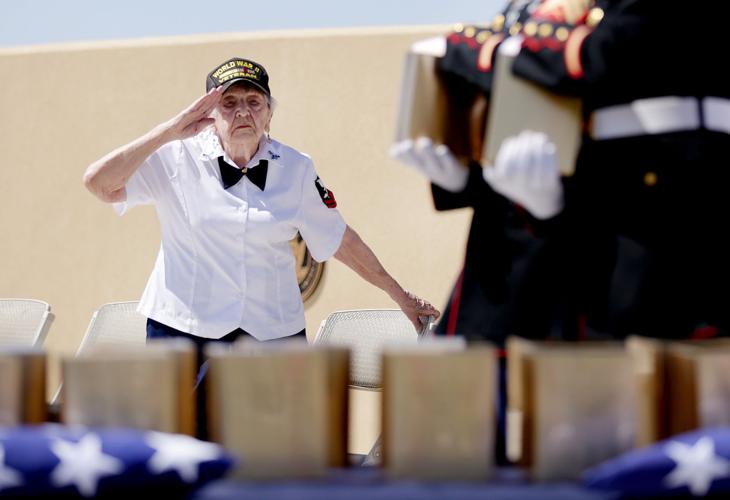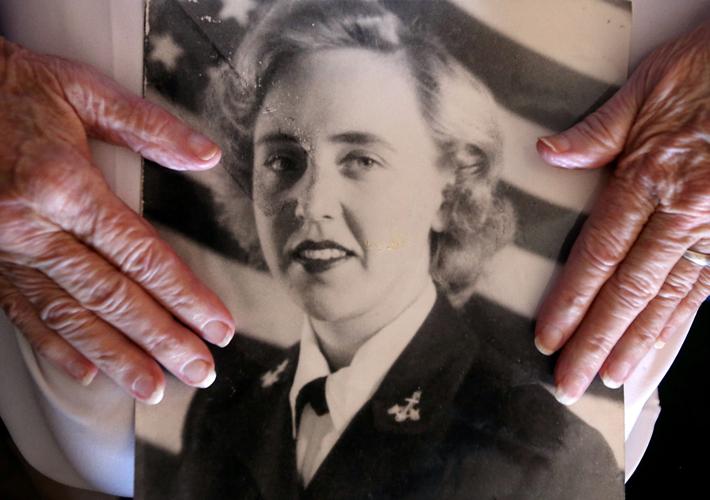This story is one part of a series about local veterans in honor of Veterans Day. Read the full story here.
____________________________________________________________
Helen Anderson Glass has lived through some interesting times, and she’d be the first to tell you.
She’d also be the first to tell you she danced with Frank Sinatra in 1940 at Frank Dailey’s Meadowbrook, a famous dance hall featuring some of the best big-band musical groups of the time in her native New Jersey.
“Only,” she said pausing briefly, “I really didn’t dance with him personally. We were on the same dance floor at the same time.”
Like many from her generation, she lived through the Great Depression, was a veteran of a World War, watched men land on the moon and has seen computers do some remarkable things.
“I’ve lived through so much history, it’s annoying,” she said with a bright smile and a chuckle. While she talks she is surrounded by colorful tote bags and lap robes bearing the logo of all the different military branches.
Some time ago Glass, 94, noticed some veterans shivering in their wheelchairs at the local VA hospital so she created a lap robe that fits over them so they can keep warm. Each has a separate military logo for the various branches: Army, Navy, Air Force, Marines and Coast Guard with a space for a note pad, pens, even a cellphone.
She has made bags for those needing walkers, busy aprons for vets with PTSD and lap robes for veterans — and those are only some of the ways she continues to serve her country.
“This is therapy for me,” she said.
It’s also her thing, a tradition that started with her father, Arthur, who was gassed, wounded and shell-shocked and who suffered from a broken blood vessel in his heart — his injuries from the “war to end all wars.”
“I’ve been doing it since I was young when I’d visit my father in VA hospitals in Florida. I’d read to vets, push their wheelchairs into the sun so they could get warm and listen to their stories.”
Even though Glass is outgoing, friendly and anxious to help them, she is quite modest regarding her contribution during World War II.
At the start of the war, her brother Arthur Anderson, who joined the Navy when the war began, persuaded her to join the WAVES, or Women Accepted for Voluntary Emergency Services, which was part of the Naval Reserves.
The purpose of the WAVES was to take over some duties from officers and men so they would be available to go to sea.
Now, Glass says, “We didn’t release a man to go to sea, we made our place in history.”
But when she went down to the recruiting station, she was shocked because they would not accept her. She was not old enough, so she would have to wait until she turned 20.
“If I had a college education, they would have taken me right away.”
She was accepted into the WAVES on her 20th birthday and became an aviation machinist, which was not too surprising considering she came from a long line of auto mechanics and electricians, including her father and brother.
“I came by mechanic work naturally,” she said.“I used to help my brother work on his cars, set the plugs, change the oil, do the lubrication, coolant, battery, tires, the works.”
In the WAVES, Glass worked on the engines of several of the most recognizable fighter planes of the era, the F4U Corsair, the F4F Wildcat and the F6F Hellcat.
She was trained to troubleshoot engine problems. “We had to make sure everything in the engine was working right. The engine had to be really clean because when they would bring them in they were messy and dirty and we had to overhaul them.”
Glass recalls at one point it was determined the engine on one of the planes came with a defective part. The oil pump came with inferior copper wiring that caused a hex nut to shear off and the engine would fail, sometimes with deadly consequences.
“Some men resented us because we were getting ratings (going up in rank) over them because we took our jobs seriously by working hard and studying more, and then we’d follow on our training. Other than that, they were wonderful.”
In 1944, she was scheduled to work in Hawaii, which was the only overseas station where the Navy would let WAVES serve, but Glass was informed her brother was missing in action and her father was in serious condition at a VA hospital. As a result, she remained stateside.
While on leave, the family was informed that her brother was killed off the coast of Italy when his ship, the USS Savannah, came under attack by a Nazi radio-controlled glide bomb.
After the war, she found closure by sending flowers to a memorial in Italy. She sent them on her brother’s birthday, Veterans Day, and Memorial Day for 10 years, she said. “He was my hero.”
Glass became an award-winning poet, using stories inspired by men and women who have served in uniform, many whom she encountered at the VA.
In an excerpt from her 2015 poem, “Peace” she wrote:
“…Peace begins with you and with me
And it should start right now
With each of us being willing to change
And take a solemn vow
To put politics behind us and uppermost
Be a loyal citizen of the U.S.A.
Our time is running out. There is none left
We must do it now. This very day!...”
In the end, it is her wish that people see Veterans Day and Memorial Day as more than just another day off.
“Take an interest in a homeless veteran, go to a veteran’s home or a hospital and see patients,” she said.
It is the least that can be done.






